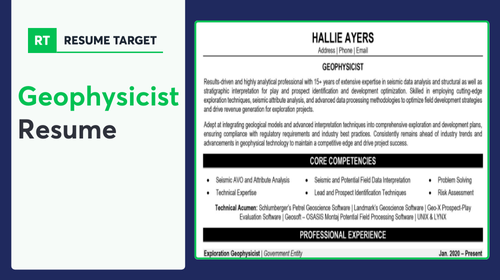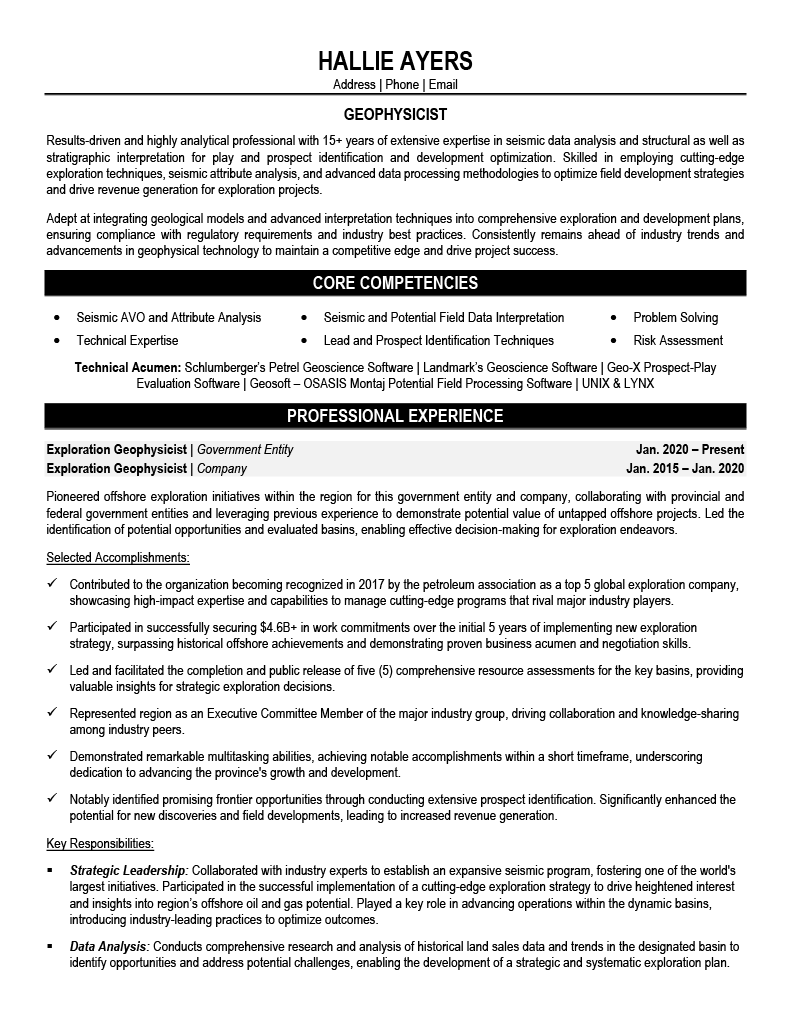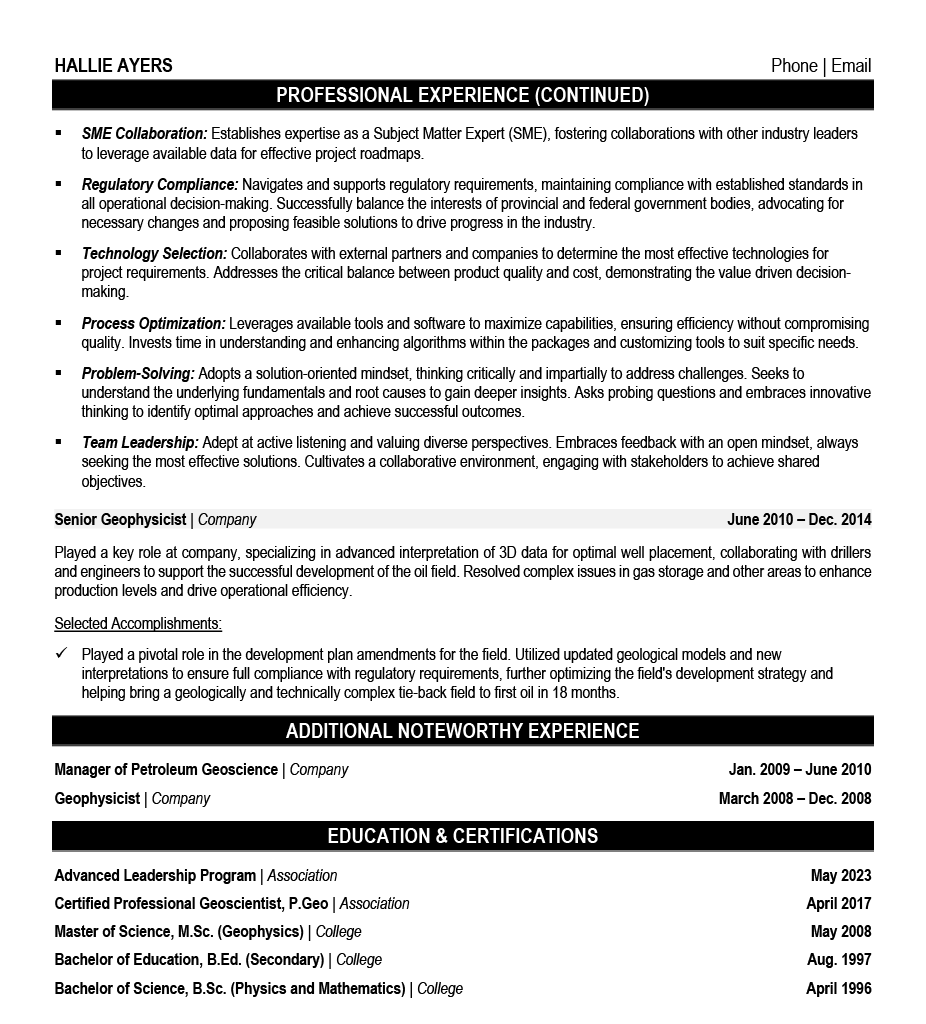

Translating complex seismic data into a compelling career story stumps even the brightest geophysicists. Your technical expertise is vast, but conveying it effectively on paper requires a different kind of precision.
Are you struggling to showcase both your analytical abilities and field experience in a way recruiters understand? A well-crafted resume bridges the gap between complex geophysical concepts and clear business value, making your expertise impossible to ignore.
Resume Target specializes in helping geophysicists transform technical achievements into powerful career narratives. We'll help you create a resume that speaks both to technical directors and HR professionals, positioning you perfectly for your next career move.


At the intersection of Earth science and physics, geophysicists are the scientific detectives who unlock our planet's hidden secrets, using advanced technology to locate valuable natural resources like oil, gas, and mineral deposits that power our modern world.
These Earth scientists combine sophisticated tools and techniques - from seismic surveys to electromagnetic measurements - to create detailed maps of what lies beneath the surface, helping companies and governments make informed decisions about resource exploration while also monitoring potential natural hazards.
If you're fascinated by both the practical and theoretical aspects of Earth science, a career as a geophysicist offers diverse opportunities for growth - whether you're interested in working with energy companies, environmental agencies, or research institutions that are shaping our understanding of the planet.
Let's talk about what's exciting in the world of geophysicist compensation! Your career path as a geophysicist offers impressive earning potential that grows substantially with experience and specialized expertise. And guess what? The field rewards your professional growth with increasingly attractive compensation packages.
Figures from: U.S. Bureau of Labor Statistics
As a Geophysicist, your career path offers diverse opportunities from technical specialization to leadership roles. The journey typically progresses from field work to senior management, with options for global mobility and consultancy.
Beyond foundational geological knowledge, advancing in geophysics requires a powerful combination of technical expertise and leadership capabilities.
- Advanced seismic data processing and interpretation - Geophysical modeling software proficiency - Project management and risk assessment - Cross-functional team leadership and stakeholder communicationLaunch your geophysicist career by combining a strong foundation in earth sciences with hands-on field experience, starting with a bachelor's degree in geophysics, geology, or a related field.
To advance in this field, you'll need to develop strong communication and technical skills, along with the ability to work effectively in team environments while solving complex geological challenges.
Requirements from Pulivarthi Group
From Texas oil fields to California's tech hubs, geophysicist roles span energy, engineering, and government sectors.
Figures from Zippia
Struggling to translate your complex seismic interpretations, geological modeling, and field research into a compelling resume that catches a hiring manager's eye? This comprehensive, section-by-section guide will show you exactly how to showcase your geophysical expertise and technical achievements in a format that resonates with both HR software and industry professionals.
As a geophysicist who analyzes complex subsurface data daily, condensing your expertise into a few powerful sentences might feel more challenging than interpreting seismic readings.
While you excel at mapping geological structures and analyzing geophysical data to uncover valuable resources, translating these technical abilities into compelling resume language that resonates with hiring managers requires a different kind of precision.
How would you describe your unique blend of geophysical expertise across different exploration methods (seismic, electromagnetic, gravity) and their application to real-world geological challenges?
Reason: This helps frame your technical versatility while emphasizing practical problem-solving abilities, which is crucial for a summary that resonates with both technical and management readers.
What would you say sets you apart in terms of integrating advanced geophysical technologies with traditional geological interpretation methods in your professional approach?
Reason: This question helps articulate your value proposition by highlighting how you bridge modern and classical methodologies, which is increasingly important in today's evolving geophysical landscape.
How have you positioned yourself at the intersection of field operations, data analysis, and strategic resource exploration throughout your career?
Reason: This helps craft a summary that demonstrates your comprehensive understanding of the geophysical value chain, showing potential employers you can contribute across multiple aspects of their operations.
As a geophysicist, you need to showcase both your technical expertise in seismic interpretation and data analysis alongside your practical field experience and research capabilities.
Your resume should highlight specialized skills like 3D seismic processing, knowledge of industry-standard software like Petrel or Kingdom, and essential soft skills such as cross-functional team collaboration and technical report writing.
Showcase your expertise in seismic interpretation and geological analysis by organizing your experience into three powerful sections: a concise role overview, quantifiable achievements in resource discovery and mapping, and your core technical responsibilities.
Many geophysicists struggle to translate complex technical analysis and subsurface interpretations into clear, business-focused accomplishments that executives can understand. Transform your seismic interpretations and geological insights into measurable outcomes by connecting your work to successful drilling programs, resource discovery rates, and cost-saving initiatives.
A strong responsibilities section demonstrates how Geophysicists interpret complex subsurface data and contribute to exploration success. Your duties should showcase technical expertise while remaining clear to non-technical hiring managers, highlighting how your work directly impacts resource discovery and development decisions.
Your advanced education and professional certifications are crucial assets in the geophysics field. Start with your highest degree in geosciences, geophysics, or related earth sciences, then highlight your technical certifications that demonstrate expertise in seismic interpretation, well logging, or potential field methods.
Now that you've built a strong foundation using Resume Target's proven resume writing guidelines, you're ready to transform your CV into a powerful tool for landing your ideal geophysicist position.
While many candidates stop at customizing their cover letter, successful geophysicists know that personalizing their resume for each position is what truly sets them apart in this competitive field.
By strategically incorporating specific geological terminology, technical skills, and project experience that match each job description, your resume will not only sail through ATS systems but will also immediately signal to hiring managers that you're the expert they've been searching for.
Ready to turn your resume into your secret weapon? Let's make every word count and show employers why you're the perfect geophysicist for their team!
Don't let a lack of professional experience hold you back from launching your career as a Geophysicist!
Your academic background in geosciences, physics, and mathematics, combined with your research projects and field work experience, can create a compelling story for employers.
Focus on highlighting your technical skills, research experience, and relevant coursework to stand out as a candidate.
For more guidance on crafting your resume, check out the Student Resume Writing Guide to ensure you're showcasing your potential effectively.
Your summary section is your chance to showcase your academic excellence in geophysics, highlighting research projects, fieldwork experience, and technical proficiencies that make you stand out.
Focus on translating your educational achievements and internship experiences into valuable skills that align with professional geophysical exploration and analysis.
"Detail-oriented and technically proficient Geophysicist with comprehensive academic training and hands-on experience in seismic data interpretation and geological mapping. Demonstrated expertise in using industry-standard software including MATLAB and Petrel through multiple research projects. Successfully completed field mapping assignments and contributed to a university-led seismic survey project. Seeking to leverage strong analytical and problem-solving abilities to contribute to geological exploration initiatives while expanding expertise in geophysical interpretation."
Now's your chance to showcase the rigorous academic foundation that prepared you for a career in geophysics - make every detail count!
Transform your coursework and research projects into compelling proof of your expertise by highlighting specialized classes like "Seismic Data Analysis"or "Earth Systems Modeling,"along with any field studies or computational research that demonstrates your technical capabilities.
The coursework for geophysicists typically includes a mix of geology and geophysics courses. Specific course names vary by university.Relevant Coursework: Seismic Data Analysis | Structural Geology | Applied Geophysics | Earth Systems Science | Geodynamics | Exploration Geophysics
Key Projects:
Seismic Interpretation Project: Conducted comprehensive analysis of 3D seismic data to identify potential hydrocarbon reservoirs in a complex geological setting. Developed detailed subsurface structural maps and identified promising exploration targets.
Ground Penetrating Radar Survey: Led a team of four students in conducting a GPR survey to map subsurface archaeological features at a historical site. Successfully identified and mapped several previously unknown structures.
Leverage your academic training, research experience, and technical proficiencies to create a compelling skills section that showcases your ability to analyze geological structures and interpret seismic data effectively.
As an entry-level Geophysicist, your combination of technical skills and analytical capabilities positions you well for a growing field where expertise in advanced geological interpretation and digital technologies is increasingly valued.
When you're analyzing complex seismic data all day, finding the right words to showcase your technical expertise on paper can feel like searching for a needle in a geological haystack.
At Resume Target, we specialize in translating intricate geophysical concepts into compelling career stories that resonate with hiring managers in the geology sector.
Our proven track record includes helping geophysicists land roles at leading exploration companies by highlighting their interpretation skills and quantifiable project impacts.
With exploration budgets opening up and new projects launching across the industry, now is the perfect time to transform your technical expertise into a powerful career narrative - let's get started with a free consultation today.
Impress any hiring manager with our Geology resume writing service. We work with all career levels and types of Geology professionals.
Learn More → Geology Resume Writing Services